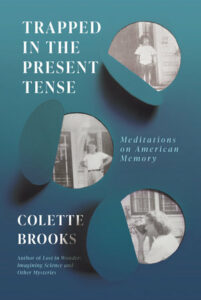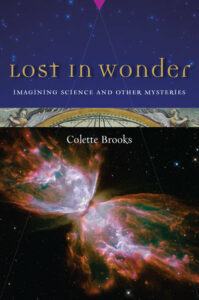Colette Brooks
Colette Brooks is the author of In the City: Random Acts of Awareness, which won the PEN/Jerard Fund Award. Her work has appeared in The New York Times, The New Republic, Partisan Review, and elsewhere. She lives in New York City.
Subscribe to our newsletter for news & events from Counterpoint Press.
Books
Trapped in the Present Tense
Meditations on American Memory
For readers of Rebecca Solnit and Jenny Odell, this poetic and inventive blend of history, memoir, and visual essay reflects on how we can resist the erasure of our collective memory in this American centuryOur sense of our history requires us to recall the details of time, of experiences that help us find our place in the world together and encourage us in the search for our individual identities. When we lose sight of the past, our ability to see ourselves and to understand one another is diminished.
In this book, Colette Brooks explores how some of the more forgotten aspects of recent American experiences explain our challenging and often puzzling present. Through intimate and meticulously researched retellings of individual stories of violence, misfortune, chaos, and persistence—from the first mass shooting in America from the tower at the University of Texas, the televised assassinations of John F. Kennedy and Lee Harvey Oswald, life with nuclear bombs and the Doomsday Clock, obsessive diarists and round-the-clock surveillance, to pandemics and COVID-19—Brooks is able to reframe our country’s narratives with new insight to create a prismatic account of how efforts to reclaim the past can be redemptive, freeing us from the tyranny of the present moment.
Lost in Wonder
Imagining Science and Other Mysteries
The splendors of science, delightfully demystified.How do we make sense of the modern world? Science is a profoundly affecting aspect of contemporary life, and yet the gulf between experts and everyone else is widening. Colette Brooks bridges the gap by playing the role of curious layperson, serving as a tour guide to some of the most important discoveries and innovations of the last five centuries.
Through serious and absurd stories alike, Brooks takes readers back and forth in time, from dark, cavernous laboratories to the pristine facilities of the twenty–first century. Laugh along with Newton, peer at the moon with Galileo, work beside the Wright Brothers, ride with the astronauts of Apollo 11, watch for UFOs in the 1950s, probe the secrets of the fruit fly, visit Chernobyl, or examine suspicious packages in a Hazmat suit. With Brooks as the guide, it’s easy to become immersed in the twists, turns, and surprises of each imaginative leap forward.
Through a series of “thought experiments," Brooks also poses questions and offers helpful tips that ease the readers way into this strange but provocative territory. Bringing her unique perspective to the larger cultural conversation about science, Brooks ultimately unleashes the most powerful force of all: our own wonder.

Catapult | Counterpoint | Soft Skull
20 Jay Street #704
Brooklyn, NY 11201
646.926.0805 | contact@catapult.co






